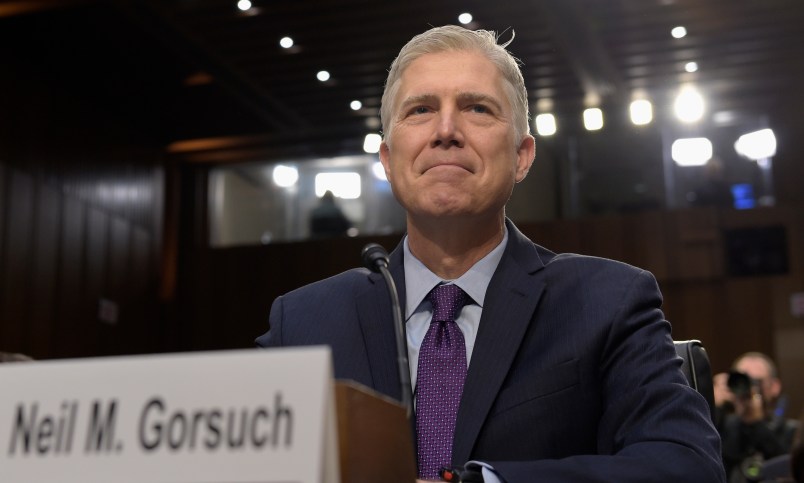Nearly 14 months, two presidents, two nominees, and one national election after Supreme Court Justice Antonin Scalia died in his sleep at a West Texas ranch, the Senate confirmed his successor Friday.
President Donald Trump’s nominee for the Supreme Court, Judge Neil Gorsuch of Colorado, where he sits on the U.S. 10th Circuit Court of Appeals, was confirmed by a deeply divided Senate 54-45 after a high-stakes battle that culminated in Republicans upending Senate rules to thwart Democrats’ attempts to block him.
Gorsuch’s confirmation closed a tumultuous chapter in the political battles that have come to characterize the Senate judicial confirmation process. Years of partisan posturing over court nominees escalated to new heights after Scalia’s death, as GOP senators – in an unprecedented move – blocked President Obama’s nominee, Judge Merrick Garland, from even receiving a confirmation hearing. Democrats’ hopes of flipping the Supreme Court for a generation came crashing down with Trump’s victory in November after campaigning on a list of judges that included Gorsuch, an appellate judge with sterling conservative legal credentials.
Senate Majority Mitch McConnell’s (R-KY) move to hold Scalia’s seat open and make the campaign a referendum on the Supreme Court likely helped Trump get elected, exit polls suggested. More importantly, it was a major power grab that cemented the rightward bent of the Supreme Court, a crucial power source for Republicans, for decades to come.
Denying Obama the ability to fill a Supreme Court seat that opened almost a year before his term ended also represented the apex of Republicans’ delegitimization of the country’s first African-American president. The bitter feelings over Garland were no doubt a factor in Democrats’ decision to fight Gorsuch’s confirmation tooth and nail.
The showdown culminated in a major change to Senate rules pushed by GOP senators Thursday after Democrats filibustered Gorsuch to block his final up-or-down confirmation vote. In some ways the use of the “nuclear option” to destroy the Supreme Court filibuster was a long time coming; Democrats were floating it last year when Republicans suggested they’d block a putative President Clinton’s nominee to the Supreme Court.
Yet senators of both parties felt uneasy about the decision, and Democrats said that the bad taste over Garland made it impossible to come to a deal with Republicans to avoid upending longstanding Senate tradition.

Like other judges who assemble resumes that make them potential high-profile judicial nominees, Gorsuch mostly avoided weighing in over the course of his career on the bench on the most polarizing issues facing the Supreme Court today. Yet he left plenty of bread crumbs that have the conservative legal movement cheering.
A book he wrote in 2006 about assisted suicide has bolstered the anti-abortion movement’s optimism that he will rule in their favor on abortion rights issues. Gorsuch has questioned the legal precedent known as Chevron deference, a reference to a Supreme Court case that gave executive agencies broad discretion in interpreting legislative statutes. More broadly, he is oft-compared to Scalia and it is believed by some court observers that he may even be more conservative than the late justice.
Gorsuch was born in and raised Denver before moving to Washington, where his mother, Anne Gorsuch, served a brief and embattled tenure as Environmental Protection Agency administrator under President Reagan. He attended Columbia University and then law school at Harvard. He served as clerks for Supreme Court Justices Byron White and Anthony Kennedy, and his confirmation Friday will make him the first Supreme Court justice to serve alongside a former mentor.
After his clerkship, Gorsuch worked in private practice and then in the Department of Justice under President George W. Bush, before his appointment to the 10th Circuit appeals court in 2006. He is married and has two daughters.
His confirmation hearing flummoxed Democrats, whose attempts to engage with him on his deeper ideology were largely rebuffed, while Gorsuch put on a charm routine for the Republicans on the Judiciary Senate Committee, who threw him softball after softball.
It is expected that Gorsuch will be officially sworn in early next week and will be sitting on the bench by the end of the Supreme Court’s 2016-2017 term, after more than a year during which Scalia’s seat was empty.











So, Neil Gorsuch successfully purchased a Supreme Court seat and the Senate was trashed in the process. Wow! Wow…
Garland: This makes me so happy.
“Ladies and Gentlemen, Democracy has left the building. Democracy has left the building.”
[bring up house lights]
He will wear the stench as long he is on the court.
Even worse, he will get to wear it for decades to come.
Worst of all, he will wear it with pride.
Mitch McConnell: Partisan first, American last.